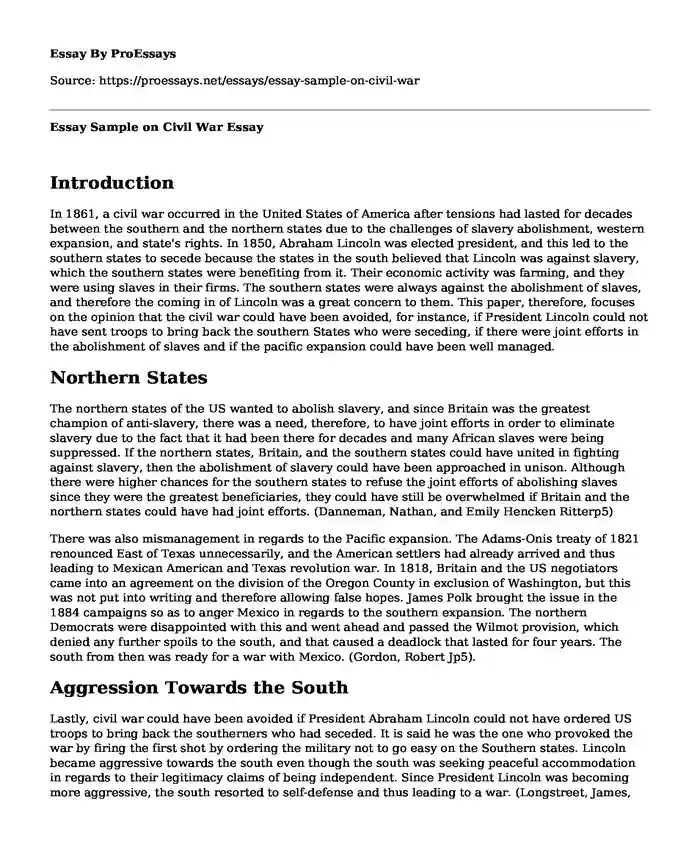Introduction
In 1861, a civil war occurred in the United States of America after tensions had lasted for decades between the southern and the northern states due to the challenges of slavery abolishment, western expansion, and state's rights. In 1850, Abraham Lincoln was elected president, and this led to the southern states to secede because the states in the south believed that Lincoln was against slavery, which the southern states were benefiting from it. Their economic activity was farming, and they were using slaves in their firms. The southern states were always against the abolishment of slaves, and therefore the coming in of Lincoln was a great concern to them. This paper, therefore, focuses on the opinion that the civil war could have been avoided, for instance, if President Lincoln could not have sent troops to bring back the southern States who were seceding, if there were joint efforts in the abolishment of slaves and if the pacific expansion could have been well managed.
Northern States
The northern states of the US wanted to abolish slavery, and since Britain was the greatest champion of anti-slavery, there was a need, therefore, to have joint efforts in order to eliminate slavery due to the fact that it had been there for decades and many African slaves were being suppressed. If the northern states, Britain, and the southern states could have united in fighting against slavery, then the abolishment of slavery could have been approached in unison. Although there were higher chances for the southern states to refuse the joint efforts of abolishing slaves since they were the greatest beneficiaries, they could have still be overwhelmed if Britain and the northern states could have had joint efforts. (Danneman, Nathan, and Emily Hencken Ritterp5)
There was also mismanagement in regards to the Pacific expansion. The Adams-Onis treaty of 1821 renounced East of Texas unnecessarily, and the American settlers had already arrived and thus leading to Mexican American and Texas revolution war. In 1818, Britain and the US negotiators came into an agreement on the division of the Oregon County in exclusion of Washington, but this was not put into writing and therefore allowing false hopes. James Polk brought the issue in the 1884 campaigns so as to anger Mexico in regards to the southern expansion. The northern Democrats were disappointed with this and went ahead and passed the Wilmot provision, which denied any further spoils to the south, and that caused a deadlock that lasted for four years. The south from then was ready for a war with Mexico. (Gordon, Robert Jp5).
Aggression Towards the South
Lastly, civil war could have been avoided if President Abraham Lincoln could not have ordered US troops to bring back the southerners who had seceded. It is said he was the one who provoked the war by firing the first shot by ordering the military not to go easy on the Southern states. Lincoln became aggressive towards the south even though the south was seeking peaceful accommodation in regards to their legitimacy claims of being independent. Since President Lincoln was becoming more aggressive, the south resorted to self-defense and thus leading to a war. (Longstreet, James, p7).
Conclusion
In conclusion, the civil war in the United States of America could have been avoided. There was a chance of avoiding the war from breaking out. As much as slavery was taking center stage, there was still a way of ensuring that the abolishment of slavery is archived without necessarily causing a fight between those who were for slavery and those who were against, which in this case were the northern states and the southern states.
Work Cited
Danneman, Nathan, and Emily Hencken Ritter. "Contagious rebellion and preemptive repression." Journal of Conflict Resolution 58.2 (2014): 254-279.
Gordon, Robert J. The rise and fall of American growth: The US standard of living since the civil war. Vol. 70. Princeton University Press, 2017.
Longstreet, James. From Manassas to Appomattox: Memoirs of the Civil War in America. Indiana University Press, 2020.
Cite this page
Essay Sample on Civil War . (2024, Jan 11). Retrieved from https://proessays.net/essays/essay-sample-on-civil-war
If you are the original author of this essay and no longer wish to have it published on the ProEssays website, please click below to request its removal:
- Managed Health Care in America Essay
- Essay Sample on US Military Intervention in Iraq
- Essay Sample on Xinhai Revolution
- Walt Disney Animation With United States History - Essay Sample
- Essay Sample on Female Genital Mutilation: A Global Crisis
- Cold War: Soviet Union & US Allies Unite, Then Divide - Essay Sample
- Essay Example on Volunteerism: Key to US Economic Growth and Student Success







